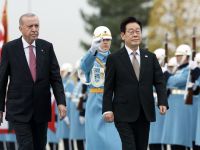A Lebanese daily has reported that the pressure being exerted on Hizbollah in the aftermath of the Sept. 11 terrorist attacks on the US has led to cracks in the party’s relations with Damascus, and at least one senior party official in the south quitting the organization.
The Beirut-based Daily Star quoted on Tuesday an unnamed inside source as saying that differences between the pro-Syrian and pro-Iranian strands in Hizbollah were more apparent than before.
The pro-Syrian elements are recommending restraint for the time being with regard to Hizbollah’s campaign to liberate the Shabaa Farms from Israeli occupation.
“The Syrians are very conscious of their seat on the UN Security Council,” the source said.
More liberal elements in Iran also advocate caution, particularly with indications of a possible rapprochement between Tehran and Washington, said the paper.
But Hizbollah’s pro-Iranian wing, which looks to Iran’s Supreme Leader Ali Khamenei for guidance, is intent on continuing operations against Israel and has no intention of abandoning its campaign in the Shabaa Farms.
The upshot of this difference of opinion was that Syria was not informed prior to Hizbollah’s two latest attacks against Israeli outposts in the Shabaa Farms on Oct. 3 and Oct. 22. All previous attacks in the Shabaa Farms reportedly came after liaison meetings between Syria and Hizbollah.
“The game has changed,” the source said. “The Americans no longer believe that Syria can control Hizbollah.”
Unlike previous assaults in the farms, said the paper, Hizbollah’s last two attacks were not “quality” strikes designed to inflict casualties. Instead, the fighters battered the well-protected Israeli outposts with mortars and anti-tank missiles. In last week’s operation, Hizbollah fired 33 Sagger anti-tank missiles, an unprecedented number for a single operation and apparently an effort to reduce its stockpile of obsolete weapons.
“They have TOWs now,” the source said, referring to the US-made anti-tank missiles which are more advanced than the Sagger.
The intention of the bombardments, said the source, was to remind the Israelis that Hizbollah was still active and also to send a message to Washington that the party would not be cowed by threats to include it in US President George W. Bush’s “war on terror.”
But the source said the prospect of Washington turning its attention to Hizbollah in the post-Afghanistan phase of the war was causing concern within the party, despite announcements to the contrary.
“Sept. 11 changed everything,” the source said. “Their biggest fear is that Syria will sell them out.”
Syria is also having a rough time after the terrorist attacks as more international pressure is place on it, amid reports of the country being on a list of possible US attacks for “harboring terrorism.”
Canadian Foreign Minister John Manley said Monday he had urged Syrian authorities to rein in Damascus-based Palestinian resistance groups as well as Hizbollah.
"I have encouraged my interlocutors to attempt to use their influence to discourage those who would use violence," Manley told reporters in Damascus after a meeting with Syrian President Bashar Al Assad.
"We don't accept using violence to promote political objectives, particularly against civilian populations," said Manley, who arrived in Syria Sunday, according to an AFP report.
"We believe groups who blow up innocent people in a restaurant to promote their political objectives are unforgivable," he added, in reference to Palestinian suicide attacks in Israel carried out by certain groups.
Syria shelters 10 Palestinian organizations, including Hamas and Islamic Jihad, which have carried out the bulk of recent anti-Israeli suicide attacks.
Manley stressed the "important part Syria had to play in the anti-terror war," led by the United States since the Sept. 11 attacks. He also mentioned Syria's role "after the (US) strikes" in Afghanistan, but did not elaborate.
The official SANA agency said that during his meeting with Manley, Syrian Foreign Minister Farouq Al Shara called on the international community to "put an end to the policy of state terrorism implemented by Israel against the Palestinian people."
Shara reiterated in front of his Canadian counterpart Syria's call for an international conference "differentiating terrorism from a people's struggle to liberate its occupied land," the agency added – Albawaba.com
© 2001 Al Bawaba (www.albawaba.com)







